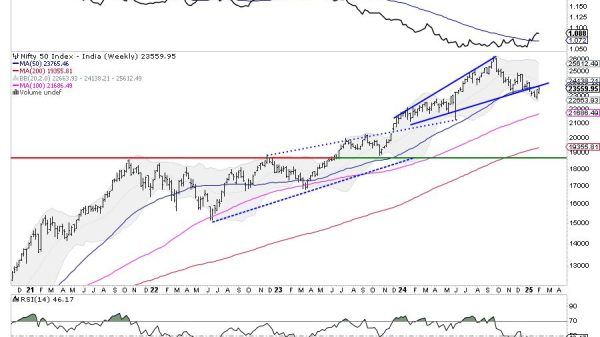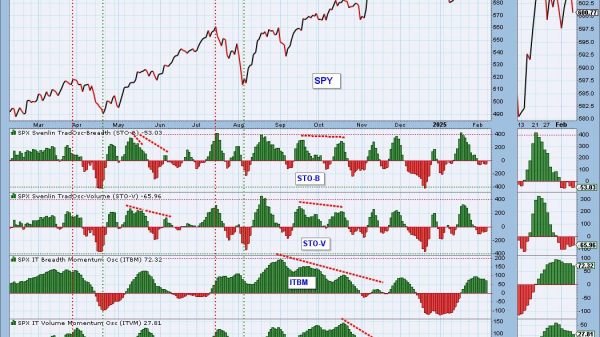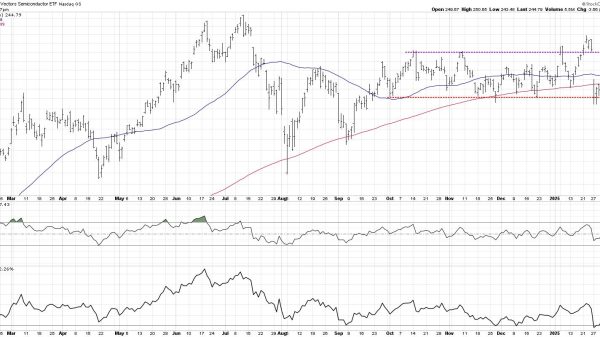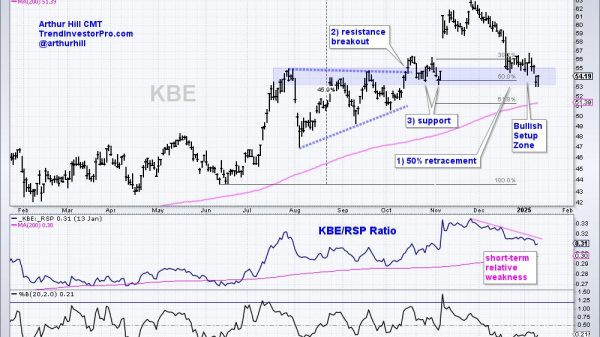Asia Stocks Waver on China Deflation Worries, Mixed Earnings
The global financial market has always been a subject of fascination for many, and the current state of the market is no exception. Asian stocks have been wavering lately, particularly due to the rising concerns of deflation in China. Only time will tell what the future holds for the global financial market and how it will impact businesses and economies worldwide.
Investors and financial analysts are keeping a close eye on the situation, as any shifts in the market can significantly impact businesses and economies worldwide. The recent trend in the Asian stock market has left many curious about what could be the underlying causes of this volatility.
One possible reason for the market’s current state could be the Chinese government’s economic policies and measures. China has been facing deflationary pressure for some time now, and its recent efforts to curb rising commodity prices and control inflation may have unintended consequences on its economy and the global market.
The inconsistent performance of businesses in various sectors might be another element that is impacting the market’s mixed results. Given that many companies are still recuperating from the impacts of the pandemic, their earnings reports could be highly unpredictable, causing the market to experience ups and downs. This unpredictability could lead to further fluctuations in the market.
Are we on the brink of a deflationary spiral?
That’s the question on many investors’ minds as Asian stocks see-saw amid fears of a deflationary trend in China. Deflation can be a vicious cycle, as falling prices lead to decreased demand, which in turn leads to even lower prices. If China, the world’s second-largest economy, falls into a deflationary spiral, it could have far-reaching consequences for the global economy. Investors will be watching to see how the situation unfolds, and whether governments and central banks take action to prevent a deflationary downturn.
Deflation in China
One of the major concerns that investors are grappling with is deflation in China. This phenomenon occurs when the prices of goods and services decrease over time, leading to a decline in consumer spending and economic growth.
While some economists believe that a moderate level of deflation can be beneficial for the economy, the prospect of sustained deflation can be alarming, as it can lead to a cycle of falling prices and declining economic activity.
In recent months, China has been experiencing a moderate level of deflation, which has sparked concerns among investors. This has led to a decline in demand for Chinese stocks as investors worry about the impact of deflation on the Chinese economy. This uncertainty has resulted in a lack of direction in the Asian stock market.
Economic Recovery in Japan
Japan has been on a slow and steady path to recovery from the pandemic-induced economic slowdown. The government has implemented several stimulus measures, including a $1.1 trillion economic package, to support businesses and households affected by the pandemic. The country’s central bank has also provided ample liquidity to ensure that financial institutions can lend to businesses.
These measures have helped to stabilize the economy, with the latest GDP figures showing a 2.8% increase in the first quarter of 2023. Japan’s exports have also been on the rise, driven by strong demand from the United States and China.
Impact on Investors
Investors have been keeping a close eye on Japan’s economic recovery, as it could significantly impact the country’s stock market. A strong economic recovery could lead to increased corporate profits and higher stock prices. Inflation has been a major concern for many countries across the globe in recent months, with prices of essential goods and services rising rapidly.
Despite these risks, investors remain cautiously optimistic about Japan’s stock market. The country’s solid fundamentals and ongoing stimulus measures could help to support the market in the coming months.
The slowdown in inflation can be attributed to several factors, including lower oil prices, reduced demand for goods and services due to the pandemic, and efforts by governments to stabilize prices through targeted interventions. While inflation is still a concern in some countries, the trend is moving in the right direction, which bodes well for the overall economic recovery in the region.
The economic recovery in Asia is gathering pace, driven by strong export growth, increased domestic demand, and government stimulus measures.
This is good news for investors, who are increasingly confident about the long-term prospects of Asian economies. Many are now looking to increase their exposure to the region, with some analysts predicting that Asia could be the next big growth story in the global economy.
Mixed Earnings Reports from Japan
Another factor contributing to the uncertainty in the Asian stock market is mixed earnings reports from Japanese companies. While some companies have reported strong earnings and outlook, others have fallen short of expectations, causing investors to question the overall condition of the Japanese economy.
One company that has reported strong earnings is Sony, which saw a 15% increase in net income in the first quarter of 2023, driven by strong sales of its PlayStation 5 gaming console. However, other companies, such as Toyota, have reported weaker earnings due to supply chain disruptions and labor shortages.
This mixed bag of earnings reports has contributed to the volatility of the Asian stock market as investors try to navigate through the uncertainty.
What Does This Mean For Investors?
The current uncertainty in the Asian stock market highlights the importance of diversification and a long-term investment strategy. While short-term fluctuations in the market can be unsettling, it is important to focus on the bigger picture and remain committed to a well-diversified portfolio.
Investors should also pay close attention to economic keys and earnings reports, as they provide valuable insights into the health of the global economy and individual companies. By staying informed and remaining patient, investors can make informed decisions that can help them weather market fluctuations.
In conclusion, the Asian stock market is currently experiencing uncertainty due to concerns over deflation in China and mixed earnings reports from Japanese companies.
While this uncertainty can be unsettling for investors, it highlights the importance of diversification and a long-term investment strategy. By staying informed and patient, investors can navigate through market fluctuations and position themselves for long-term success.
The post Asia Stocks Waver on China Deflation Worries, Mixed Earnings appeared first on FinanceBrokerage.































